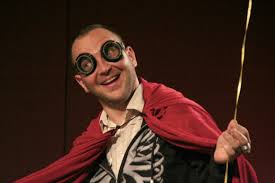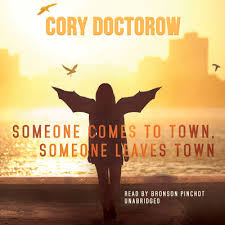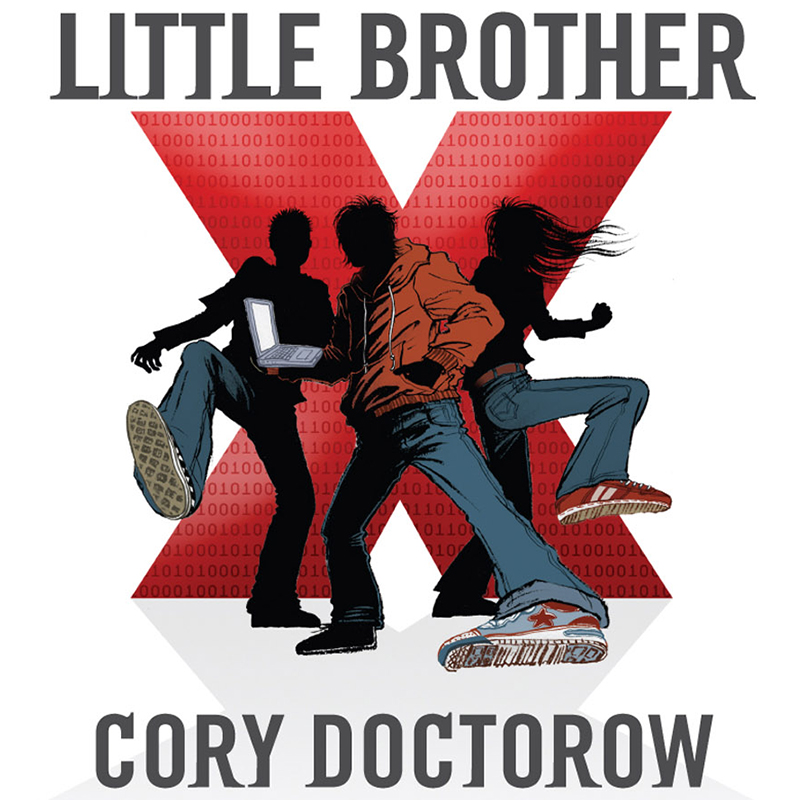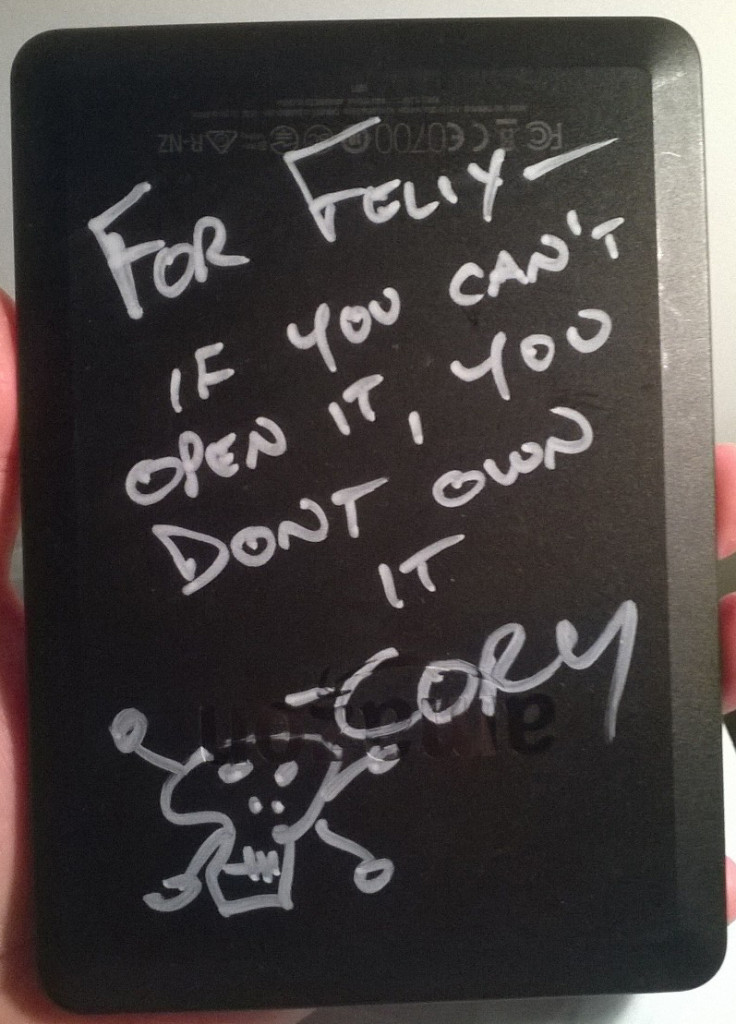The Wheeler Centre had an Interrobang. They invited some speakers to answer tricky questions. Cory Doctorow? Oh yeah. Book those tickets! Next day, the session is sold out!
But hey, when we got there – place half full – or half empty – depending on your point of view. Whaaaaa … ? We had friends who would have bought tickets. Wheelers Centre fail. Cory Doctorow is an important thinker of our age. More Melbournians needed to hear him. For those who missed out on this, and the other two sessions, let me attempt to sum up.
Doctorow’s a founding editor of Boing Boing and contributor to The Guardian, Wired and Publishers Weekly. He’s one of the founders of Electronic Frontier Foundation. And there’s his take on the Gordian knot that is copyright and DRM. His attitudes to Creative Commons is why my Ektek saga is currently available free of charge. Although, when chatting to him after the session (face-to-face banter!!) his comment, ‘Oh, yeah, you have to have something people want to steal,’ cut deep.
I’ve only read two of his novels – both provocative in their own ways.
Someone comes to town, Someone leaves town gives the reader the bizarre experience of characters coming in and out of focus due to constant name shift. You really do have to read it for yourself. Little Brother is one of those books written in six weeks that just drives the reader (ostensibly a young adult) through a world they need to know about. There’s now a sequel and plenty of other writing to explore.
Doctorow is from Ontario and his dad was a computer scientist. Cory grew up with one of the first connected terminals in his living room. He’s always had the internet in his life. He sees no difference between being in the world and being in the internet. The title of his conversation with Alan Brough was about destroying the internet before it destroys us. Of course, no one is advocating the destruction of the internet but Cory is suggesting we do have a good long hard look at it. Doctorow has long spoken about the dangers inherent in devices with cameras and microphones on your desk that may or may not be within your control. Do you want to be in charge of your computer or be controlled by state or corporate powers that can see your contacts, your searches and you? ‘Yes, Master’ or ‘I can’t let you do that, Dave.’
Doctorow is one of those fluent thinkers and activists who speak very quickly and think very widely so summing up the fifty odd minutes we spent in his presence is impossible. I’ll try.
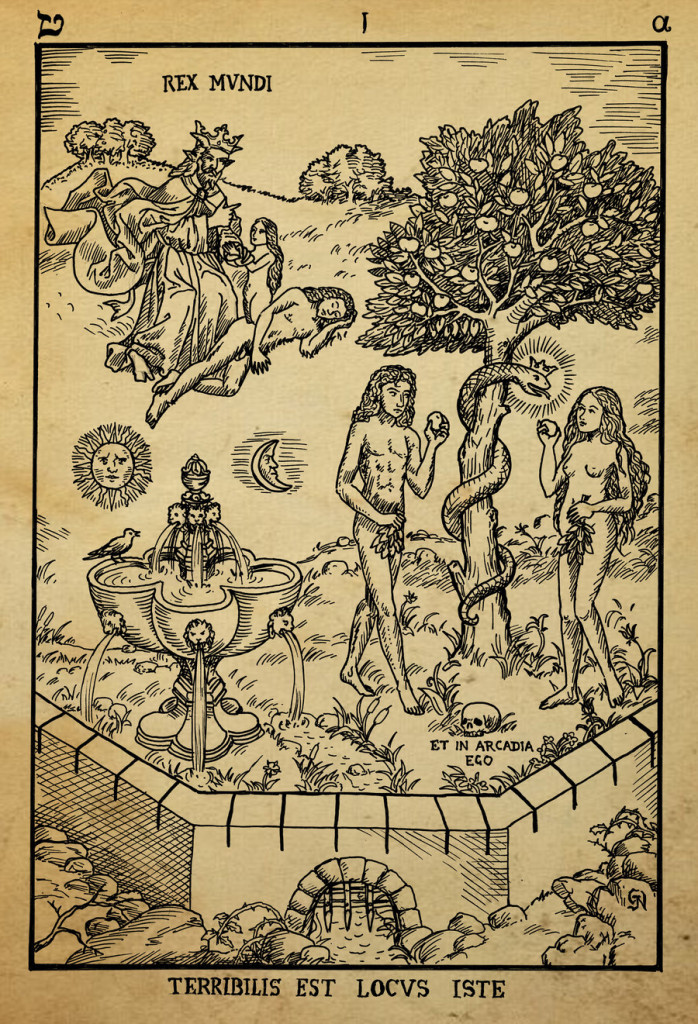
https://www.google.com.au/url?sa=i&rct=j&q=&esrc=s&source=images&cd=&cad=rja&uact=8&ved=0ahUKEwjv9snP57nJAhXBIqYKHUU7AicQjB0IBg&url=http%3A%2F%2Faetherforce.com%2Ftheory-practice-alchemy%2F&psig=AFQjCNF8_BC3Mep9fRB8FpPNqn0wemQ6dA&ust=1449029960654035
One of his basic tenets involves disclosure. He likens the way people deal with information on the internet with that of alchemists in the Age of Darkness. That by non-disclosure, we lead into an elite of those who know and those who don’t know. (By chance I happened to hear a fascinating interview with John Le Carre, a spook of high intelligence, in which he comments that the UK went into Iraq as a result of those thinking they knew, knowing wrong. He also remarked that after the Cold War, it became obvious that the USA was always the greater power and that the entire stand-off was a construct by people looking for something to do with the arms they’d built.)
Back with Cory, another of his tenets is around locked dependency. If you can’t open it, is it yours? If you can’t open it you can’t change it, can you. One of the clearest examples is John Deere tractors. The tractors can now carry technology that, as they move around paddocks, collect detailed data such as soil fecundity. This information is valuable to a techsavvy farmer. (You do know that behind every successful farmer is a partner working in town?) But, who else might like this info? What about uploading your priceless data to the cloud to share with corporations who might want to sell you things? The John Deere agreement is with an organisation called Climate Corporation. From the New Yorker article about this corporation:
The mission statement, “To help all the world’s people and businesses manage and adapt to climate change,” is an explicit echo of Google’s sweeping promise to “organize the world’s information and make it universally accessible and useful.”
Climate Corporation is an insurance agency. They insure farm land against extremes of climate brought on by climate change. And they’ve just been bought by Monsanto. What about a seed company like Monsanto knowing all the specifics of your farmland? What could possibly go wrong?
Corey also spoke about diabetes data. Diabetes patients increasingly rely on technology to help communicate with doctors and to link with providers of their drugs. They can upload their personal information to the magic cloud; every detail from meals, to measurements of weight, blood sugars, amounts of insulin, wheres and whens … everything. Who owns this information? What do the patients do to protect it from people who might benefit from knowing more? Information. Keep it close or share it?
So there’s content, there’s software and there’s hardware and all those things might have locks at various levels. If a hacker is determined, they will break those locks or, even better, find a flaw that provides access. Once discovered, the flaw has to stay vulnerable, for it to be exploitable. So for spies, ‘no one but us’ – NOBUS – should know about the flaw so that only we can use it to gain access to the secret (commercial or otherwise). Clearly this makes the assumption that we are the only clever spies. (I say we because Australia’s deep connections with the USA are, of course, totally trustworthy. Mr Doctorow didn’t go into that.)
In summary, will we have access to a new Age of Enlightenment? Will everyone share everything or are there reasons to (and can you) keep your activities private?
And does the internet offer international democracy? Allow merit to shine through the obscurity? Maybe. For example, how does a cool band in Rwanda go viral?
<iframe width=”420″ height=”315″ src=”https://www.youtube.com/embed/8iKTMKLejCA?rel=0″ frameborder=”0″ allowfullscreen></iframe>
